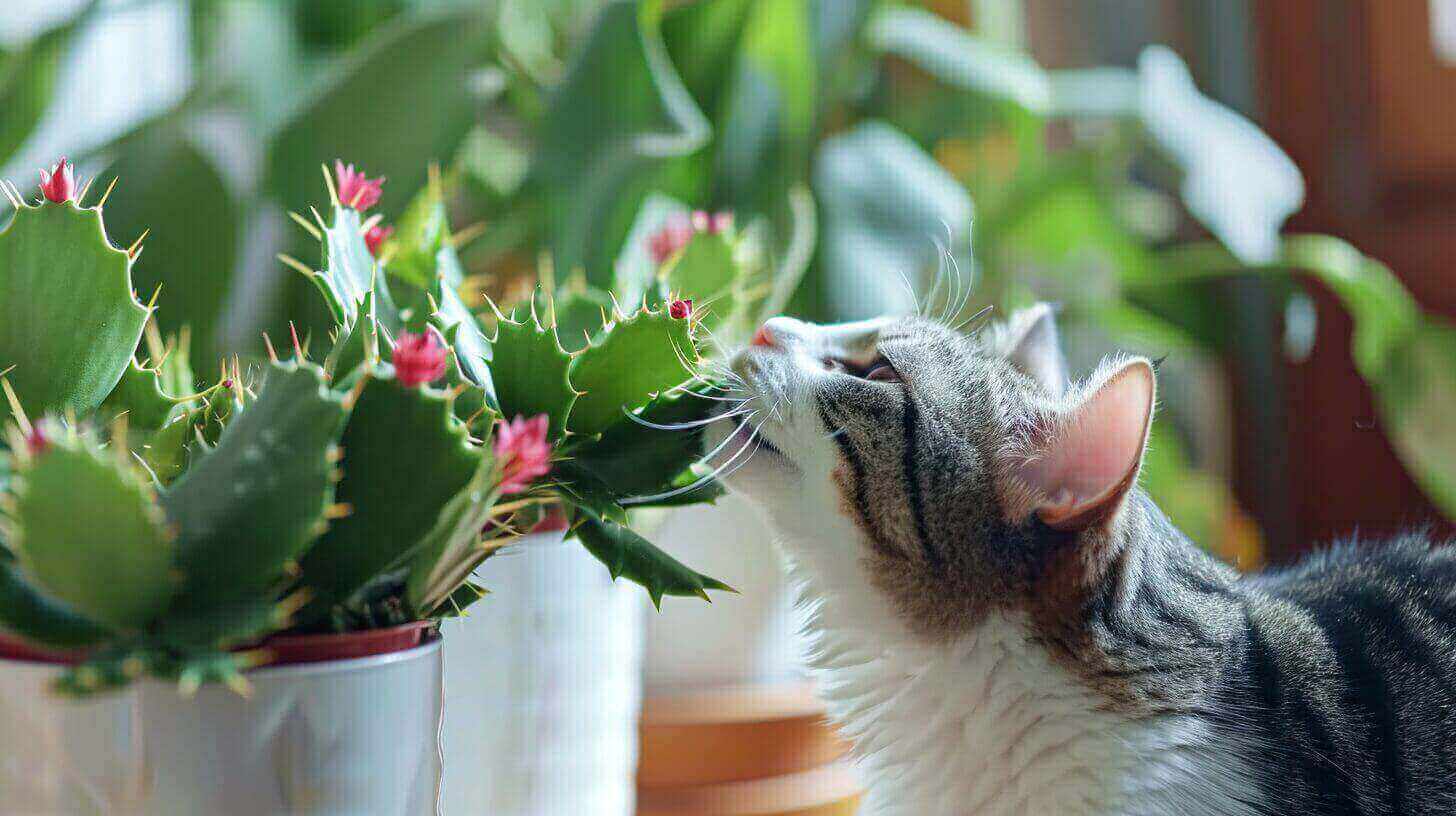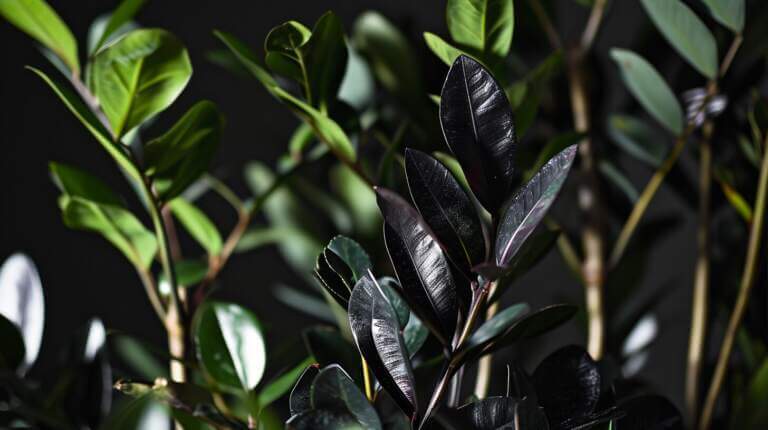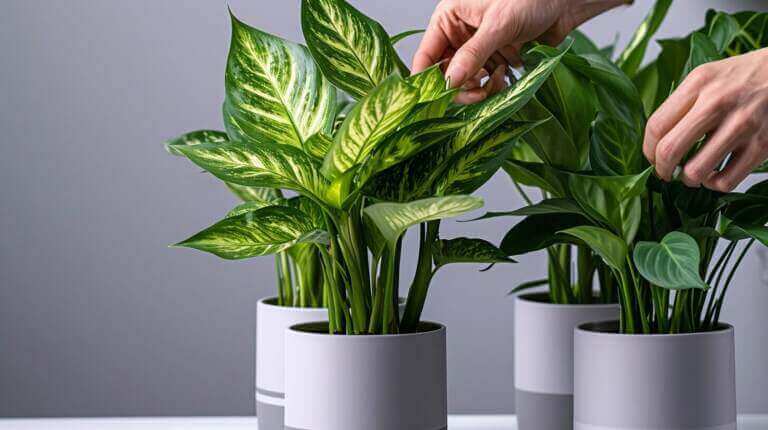Are Christmas Cactus Poisonous to Cats or Dogs? Safety Tips for Pets
One common concern is whether Christmas cactuses pose a risk to cats and dogs. So is Christmas cactus poisonous to dogs? Let’s explore the facts to ensure the well-being of our furry friends.
Contrary to popular belief, Christmas cactuses plant are not toxic to cats and dogs. However, it’s crucial to exercise caution as they can still cause gastrointestinal distress if consumed in large amounts. The fiber and roughage in the plant can irritate their digestive systems, leading to symptoms such as vomiting, diarrhea, or constipation.
Key Takeaways:
- Christmas cactuses are not poisonous to cats and dogs but can cause gastrointestinal distress if ingested in large amounts.
- Monitor your pet for symptoms such as vomiting, diarrhea, or constipation after consuming a Christmas cactus.
- Contact your veterinarian if your pet shows any signs of discomfort.
- Be aware of other holiday plants that can be toxic, such as mistletoe, holly, lilies, amaryllis, yew, snowdrop, laurel, and poinsettia.
- Research the toxicity of plants before bringing them into your home and keep them out of your pet’s reach.
What to Do If Your Pet Eats a Christmas Cactus?
If your cat or dog decides to eat a Christmas cactus, it’s important to take prompt action. While a small amount is unlikely to cause harm, a large ingestion can lead to gastrointestinal distress. It is recommended to contact your veterinarian immediately for advice. They may recommend monitoring your pet or bringing them in for an examination, especially if they show any signs of illness. Early intervention is key to prevent symptoms from worsening. Veterinarians suggest keeping your pet in a separate room with their own food, water, and litter box if there are other pets in the house. Regularly monitor your pet’s food intake and bowel movements to ensure they are recovering well.
In case of a Christmas cactus ingestion, the veterinary advice includes closely observing your pet for any signs of discomfort or illness. Vomiting, diarrhea, or a change in their usual behavior may indicate that they are experiencing gastrointestinal distress. It is crucial to seek professional guidance by contacting your veterinarian as soon as possible. They will be able to provide specific advice based on your pet’s size, breed, and overall health condition.
Additionally, your veterinarian may recommend monitoring your pet’s vital signs, such as their heart rate and body temperature, to ensure they are stable. In some cases, they may advise inducing vomiting or administering activated charcoal to help alleviate any potential toxicity. It is important to follow their instructions carefully and refrain from attempting any home remedies without professional guidance.
Plants Poisonous to Dogs—Keeping Pets Safe During the Holiday Season
While Christmas cactuses are generally safe for dogs, it’s essential to be aware of other plants that can be toxic to them. Some common holiday plants that are poisonous to dogs include mistletoe, holly, amaryllis, poinsettia, and the Christmas tree itself. Mistletoe can cause a drop in blood pressure and a slow heart rate, while holly berries contain saponins, which can cause symptoms such as drooling, vomiting, abdominal pain, and diarrhea. Amaryllis bulbs contain phenanthridine alkaloid, which can lead to changes in blood pressure, tremors, seizures, and vomiting. Poinsettias, while less toxic, can still cause gastrointestinal discomfort. It’s important to keep these plants out of your dog’s reach and to quickly contact your veterinarian if ingestion occurs.
To provide further insight into the toxicity of these plants, let’s take a closer look at the potential effects:
| Plants | Effects on Dogs |
|---|---|
| Mistletoe | Drop in blood pressure, slow heart rate |
| Holly | Symptoms include drooling, vomiting, abdominal pain, diarrhea |
| Amaryllis | Changes in blood pressure, tremors, seizures, vomiting |
| Poinsettia | Gastrointestinal discomfort |
Keeping Cats Safe: Pet-Friendly Plants and Precautions During the Holiday Season
During the holiday season, it’s crucial to take extra precautions to keep our beloved feline companions safe. By choosing pet-friendly plants and implementing some simple measures, we can ensure a worry-free and enjoyable time for our cats.
When it comes to selecting plants for your home, consider options like Christmas cactuses and orchids. These plants are generally non-toxic to cats and can be a beautiful addition to your holiday decor. Additionally, you can provide cat grass and catnip as alternative greenery for your cat to nibble on, keeping them entertained and away from potentially harmful plants.
However, it’s important to be aware of the plants that can pose a danger to our feline friends. Lilies, in particular, are highly toxic to cats and can cause acute kidney failure even from minimal ingestion. Keep these plants out of your cat’s reach and consider removing real plants from your home if your cat tends to graze on them.
Furthermore, precautions should be taken with the Christmas tree. The tree’s sap, tinsel, and ribbon can all be harmful if ingested by cats. To prevent access to these potential hazards, consider using a Christmas tree pet gate to block off the lower branches and secure loose decorations. This will help ensure a safe and joyous holiday season for your cat and the whole family.
FAQ
Is a Christmas cactus poisonous to cats and dogs?
The Christmas cactus is not considered poisonous to cats or dogs. However, if a dog eats a Christmas cactus, it may cause an upset stomach.
What happens if a dog eats a Christmas cactus?
If a dog eats a Christmas cactus, it might experience an upset stomach. While the plant is not toxic to dogs, its fibrous plant material can irritate the animal’s digestive tract.
How do I care for a Christmas cactus around pets?
When taking care of a Christmas cactus around pets, ensure the plant is placed in a location where your pets cannot easily access it. This is to prevent them from eating the cactus, which can cause an upset stomach.
Are there any holiday plants that are poisonous to cats?
Yes, some holiday plants are poisonous to cats. It’s always best to check with a reliable source like the ASPCA if you’re unsure about a specific plant.
Is the Christmas cactus a safe houseplant for homes with pets?
Yes, the Christmas cactus is a safe houseplant for homes with pets. It’s non-toxic to both cats and dogs.
Are Christmas plants generally toxic?
Not all Christmas plants are toxic. While some can be harmful to pets if ingested, others like the Christmas cactus are non-toxic.







